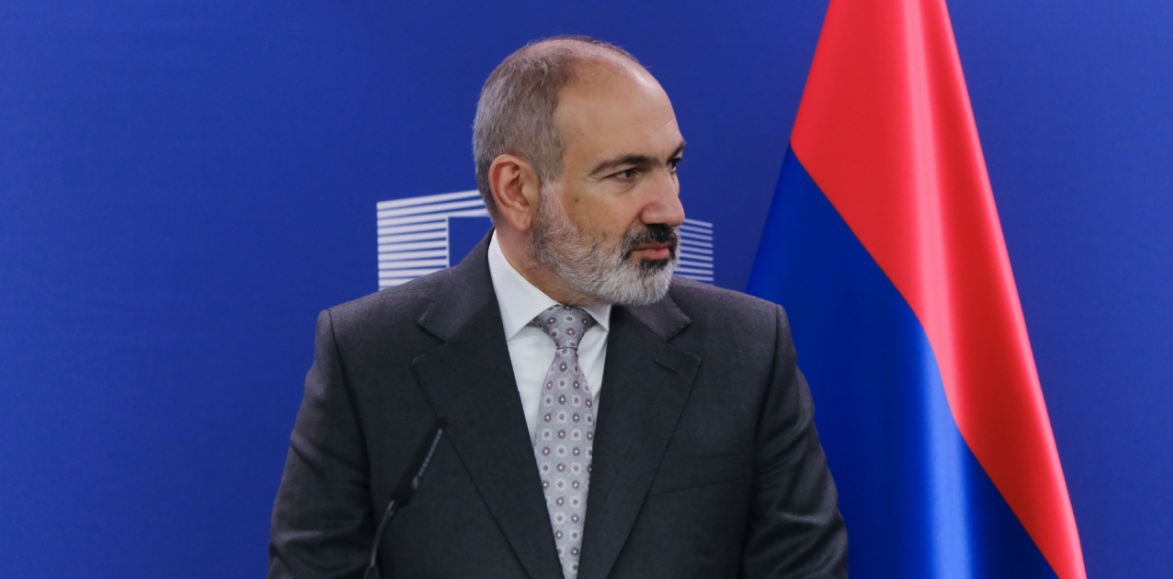The Price of Peace in the Caucasus

Armenia’s prime minister has diligently worked for peace and integration in the Caucasus despite withering domestic criticism.
The political survival of Armenian prime minister Nikol Pashinyan has been nothing short of remarkable. Since rising to power during Armenia’s 2018 Velvet Revolution, the embattled prime minister has withstood the fallout from the 2020 Karabakh war, open hostility from the Kremlin-backed Armenian Apostolic Church, and alleged coup attempts. His pursuit of peace with Azerbaijan and closer ties with the West has earned him powerful enemies—from the Russian government to diaspora organizations to Armenia’s former leaders.

With a final peace deal on the horizon and parliamentary elections looming next year, the stakes could not be higher. If Pashinyan holds on, he may guide Armenia into a long-sought era of peace. If he falls, the country risks sliding back into Moscow’s orbit, as its neighbor Georgia has, and could reignite conflict in the South Caucasus.
At the August 8 Washington Peace Summit, US president Donald Trump praised Pashinyan’s courage. After 30 years of bitter conflict over Karabakh, pursuing peace with Azerbaijan—especially after Baku’s battlefield victory—was politically difficult. If Washington wants to secure that peace, it must also secure Pashinyan’s political survival. Despite remaining Armenia’s most popular politician, he now polls at just 17 percent, reflecting widespread disillusionment and apathy.
The United States can help Pashinyan prove that his policies bring tangible benefits. Strategic investment in Armenia’s “Crossroads for Peace” initiative and its emerging AI sector could boost the economy, create jobs, and solidify Armenia’s role as a key transit hub. Washington must also resist pressure from well-funded diaspora groups like the Armenian National Committee of America (ANCA), which oppose peace despite not bearing the consequences of renewed war.
Encouragingly, Armenia is beginning to see the first tangible dividends of its peace efforts. This week, Azerbaijan announced it would allow the transit of goods to Armenia, and the first shipment of Kazakh wheat is expected to cross through Azerbaijani territory soon—a modest but symbolically important step toward regional economic integration.
Armenia’s role as a transit hub is of direct importance to US interests. The Middle Corridor—a critical overland trade route from East Asia to Europe that bypasses Russia and Iran—currently runs through Azerbaijan, Georgia, and Turkey. But Georgia’s tilt toward Moscow under the ruling Georgian Dream party casts doubt on its reliability. Armenia could serve as a crucial alternative.
Pashinyan anticipated this when he launched the Crossroads for Peace initiative in October 2023, envisioning Armenia as a regional connector through revitalizing railways, highways, pipelines, and power lines. For decades, Armenia’s regional isolation stemmed from closed borders with Turkey and Azerbaijan due to the Karabakh conflict. Now, with a peace deal that may soon reopen those frontiers, Armenia has a unique chance to establish itself as a vital East-West transit hub—especially as routes through Russia, Iran, and the Red Sea grow less stable due to global conflicts.
Moscow, however, is unlikely to stand aside. Russian ambassador Sergei Kopyrkin bluntly stated that “Russia is not only not leaving the South Caucasus, but is not weakening its attention to either the situation in the region or its relations with the Republic of Armenia, as a fraternal and allied country” and that Russia’s 102nd military base in Gyumri was “the most important supporting structure of Armenia’s security.” For Russia, Armenia has long been part of its dominion, and the Kremlin will not surrender influence without resistance.
Already, Russian-Armenian oligarch Samuel Karapetyan has been arrested on coup-plotting charges, while senior members of the Armenian Apostolic Church openly campaign for the overthrow of Pashinyan’s government. Former President Robert Kocharyan—an advocate of Armenia’s integration with Russia—has emerged as one of his fiercest critics, aligning himself with the church and Karapetyan. Kremlin propagandists like Margarita Simonyan and Vladimir Solovyev openly call for Pashinyan’s removal and for Russia to protect Karapetyan.
Pashinyan’s weakened political base compounds the threat. His Civil Contract party’s approval has collapsed since the euphoria of 2018, when he enjoyed 82 percent support. The Second Karabakh War in 2020 was a turning point: Azerbaijan’s reconquest of most of Karabakh sparked mass protests, with demonstrators branding Pashinyan a traitor. In 2023, Azerbaijan’s takeover of the remaining Armenian enclaves triggered a mass exodus of Karabakh Armenians, dealing Pashinyan another heavy blow. Last year, the church mobilized against him, fueling large demonstrations in Yerevan.
Yet Pashinyan is not alone in his decline. Russia, once seen as Armenia’s indispensable ally, has suffered a dramatic collapse in public trust. In 2019, 93 percent of Armenians rated the state of Yerevan-Moscow relations as “good.” By September 2024, that number had plunged to just 35 percent, with many viewing Russia as having betrayed Armenia during the conflict over Karabakh. Pro-Russian figures like Kocharyan fare even worse, with his polling now at just 2 percent.
Russia may be down, but it is not out. If Moscow succeeds in removing Pashinyan, it would likely exploit Armenian discontent and nationalism to reignite conflict with Azerbaijan—using the instability to play both sides against each other and keep them dependent on Russian influence, as it once did in Karabakh.
For Washington, helping Pashinyan succeed is not simply about one leader’s survival—it is about proving that peace and sovereignty can coexist in the post-Soviet space. Armenia’s future, and perhaps the stability of the South Caucasus, depends on it.
- Questions and Answers
- Opinion
- Motivational and Inspiring Story
- Technology
- Live and Let live
- Focus
- Geopolitics
- Military-Arms/Equipment
- Securitate
- Economy
- Beasts of Nations
- Machine Tools-The “Mother Industry”
- Art
- Causes
- Crafts
- Dance
- Drinks
- Film/Movie
- Fitness
- Food
- Jocuri
- Gardening
- Health
- Home
- Literature
- Music
- Networking
- Alte
- Party
- Religion
- Shopping
- Sports
- Theater
- Health and Wellness
- News
- Culture

